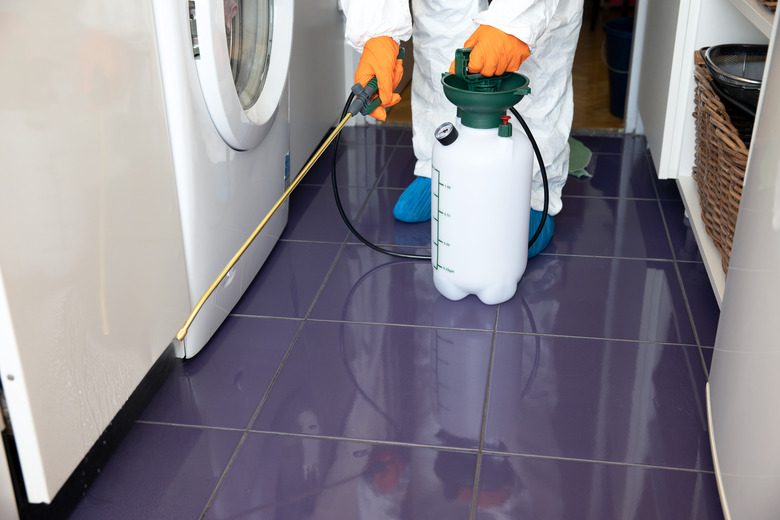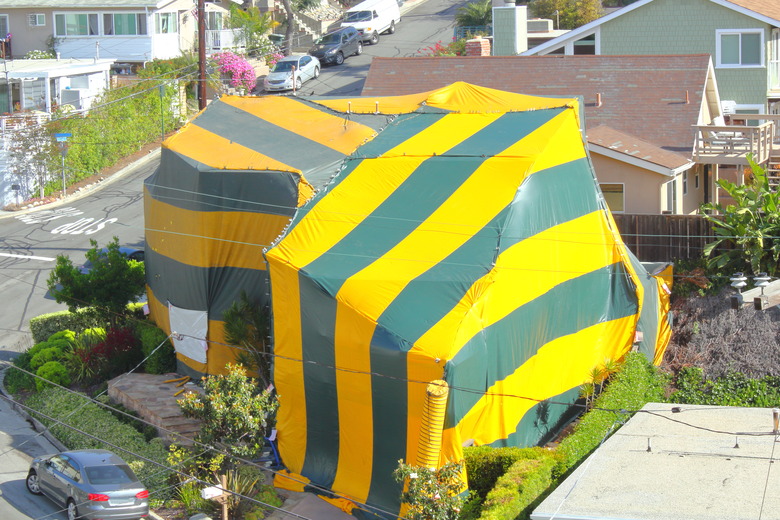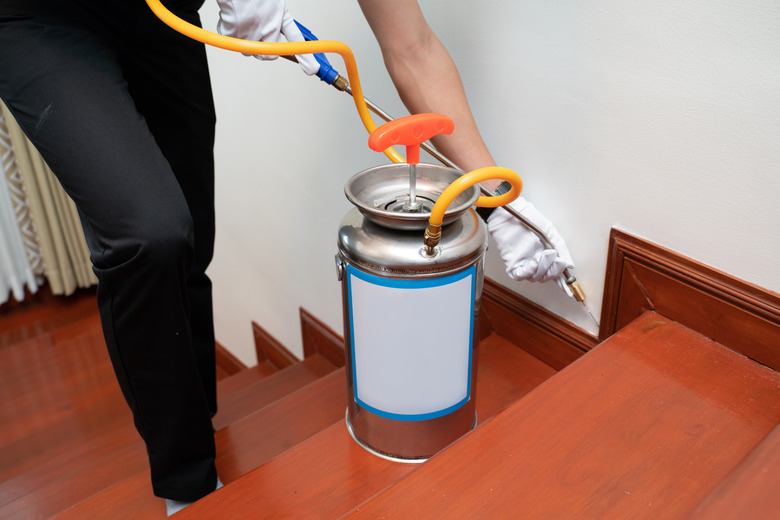6 Questions To Ask Before Hiring Professional Pest Control
We may receive a commission on purchases made from links.
If you're thinking about hiring a pest control professional, chances are that the scope of the project is a bit more than you're able to take on yourself — or, let's face it, more than you're willing to stomach. Although you likely want to get rid of the pest problem as quickly as possible, it's still important to do your due diligence when hiring a pro.
Before you make a hire, ask the pest control technician ahead of time about things like the scope of the project, the cost and most importantly, whether the chemicals are potentially toxic to pets, people and the environment.
1. Is There a Free Estimate or Inspection?
1. Is There a Free Estimate or Inspection?
As with other types of contractors, some pest control companies offer a free consultation, a free inspection or a free estimate at the very least. A consultation is usually done over the phone or via email without an on-site visit, and a recommendation for a course of action is given based on information you provide.
A free inspection is one step beyond that. At this point, you're probably ready to hire the pro, but she needs to see the scope of the problem herself. Check the pest management company's website or ask about free inspections to ensure they're actually free even if you decide not to hire the firm. Some pest control businesses may charge a fee for an inspection, but it could be worth it to find out the full scope of a problem and its potential solution.
A free estimate is just a ballpark figure based on your description of the situation. Every company should be able to offer a generalized minimum and maximum project cost, but an estimate written up after an actual inspection is generally the most accurate.
2. What Pest Control Chemicals Will You Use?
2. What Pest Control Chemicals Will You Use?
Ask the pest control specialist what kinds of chemicals are used to treat the pest problem if it's an insect infestation indoors. The best pest control companies should be able to show you the actual chemical names or product labels, including warnings about the product. Ask to see the material safety data sheets for each chemical. Many of the ingredients used to kill fleas, bed bugs, ticks, termites and other indoor pests may be toxic to humans and pets as well.
If you aren't comfortable with the toxins suggested for pest control, find out if the company offers a safer and more eco-friendly option. Ask what the safe form of treatment entails and how long the treatment lasts before another application is needed.
3. What Preparations Do I Need to Take?
3. What Preparations Do I Need to Take?
In some cases, such as tenting your home, using insect foggers or spraying a specific room, a little preparation is required before the pest control services begin. Since these types of chemicals float through the air, everything within the treated area gets exposed to potentially toxic substances. Ask the pest management professionals specifically what you should do well in advance of the treatment day. When toxins are involved, at the very least, you'll need to remove plants and pets from the area as well as any permeable food containers, such as cereal boxes. It's a good idea to take all small items out of the treatment space if treating just one area.
If the exterminator tents your home to treat the entire indoor space, you'll have to stay away for at least several days. Get clear instructions and specific details ahead of time so you can plan a stay at a hotel or with family or friends for the full amount of time necessary. It's far too dangerous to enter the home before the specified waiting period is over. Air out the home for as long as is recommended once you are allowed to return. Though the chemicals dissipate over time, you should still thoroughly wash all kitchenware and clean all washable surfaces once it's safe to move back into your home.
4. Is the Work Guaranteed?
4. Is the Work Guaranteed?
A reputable company should offer some form of guarantee that it will solve your pest problem. Some types of pest control, such as ant infestations, require more than one visit, so the company may offer a monthly treatment plan to keep those buggers at bay. The company should guarantee that the treated area remains pest-free either between treatments or after the pro states that the problem has been solved. This guarantee should be in writing, offering to return to treat the problem again free of charge or to refund payment.
For a problem such as squirrels, bats or raccoons that made your home their own, make sure the company guarantees to solve the problem for good in order to receive full payment. This ensures you won't have to hire and pay for several different companies to solve this type of infestation, which typically requires several visits. The company should also pinpoint and repair the entry point so the animals don't move in again.
Any agreement with a reputable company should spell out the scope of the pest control plan in writing, including what will be done and the price to do so. Read the contract carefully to determine what is and what is not covered.
5. What Training, Certification and Insurance Do You Have?
5. What Training, Certification and Insurance Do You Have?
If the pest treatment plan requires special pro-grade chemicals, someone present on the crew should be a certified pesticide applicator or a licensed technician. Licenses can be verified with your state's department of agriculture. Removal of wild animals also requires a license in many states, so ask if the animal control company is licensed to do so. As with using chemicals, it's not necessary for everyone on the pest control crew to have a license or special training, but those without the credentials must be supervised by a co-worker who has already met the requirements.
A good company should also carry general liability and workers' compensation insurances. Insurance is important in case something is damaged during the project. Workers' compensation helps protect the workers in the event of injury on the job.
6. What About Long-Term Solutions?
6. What About Long-Term Solutions?
A good long-term pest control solution is proactive rather than just reactive, finding ways to keep the pests out of your home as much as possible rather than killing them once they become a problem. This may mean repairing or adding window screens and filling small cracks in areas of the home that allow insects indoors. For problems such as squirrels in an attic, ask if they recommend trimming tree branches or similar landscaping solutions that make it more difficult for a squirrel to get onto the roof and into the attic.
You also should ask about long-term treatment plans, which involve spraying pesticides every certain number of weeks or months whether insects are seen or not. These may not be necessary. On the other hand, a scheduled plan using baits — which work well for termites, rodents and some types of ants — rather than insecticides may be worthwhile, as the baits need to be checked and replaced by a professional.
References
- United States Environmental Protection Agency: Tips for Selecting a Pest Control Service
- Orkin: Pest Control Estimate
- U.S. News & World Report: What to Know Before Hiring a Pest Control Service
- Pollinator Partnership: Bee Rescuers
- Modern Pest Services: Animal Control or Wildlife Control: Which Do I Need?
- Ohio Department of Natural Resources: Commercial Nuisance Wild Animal Control Operator License


